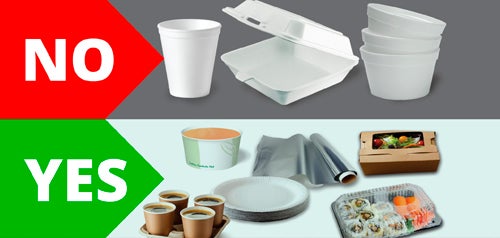San Diego Single Use Plastic Reduction Ordinance
The City of San Diego's Single Use Plastic Reduction Ordinance (SUPRO) became effective as of April 1, 2023.

Summary:
- Most polystyrene foam containers are prohibited from distribution and sale. This includes food service ware such as bowls, plates, trays, cups, lids, and other similar items, as well as egg cartons and meat trays.
- Single use plastic (and bio-plastic) straws and utensils may only be provided upon the request of the customer.
- The following may not be distributed if made from polystyrene foam unless encased within another material:
- Coolers, ice chests, or similar containers.
- Pool or beach toys.
- Dock floats, mooring buoys, or anchor or navigation markers.
- All polystyrene foam products are prohibited from City facilities (including parks and beaches).
NOTE: The automatic waiver for small businesses with a gross income of $500,000 or less expires March 31, 2024. Waivers may be available for feasibility-based hardship and financial hardship. Exemptions are available if your business was impacted by the Jan. 22, 2024 storm. For a waiver application, email
sdrecyclingworks@sandiego.gov sdrecyclingworks@sandiego.gov.
Why is this important?
Polystyrene foam products are typically used one time before being discarded, and due to their light weight can easily become litter. Polystyrene foam litter breaks down into small pieces which do not biodegrade and often end up in streets, canyons, waterways, storm drains, and eventually the ocean, where it harms wildlife that mistakenly ingests it.
Plastic straws are a significant contributor to marine pollution and are among the most common forms of litter collected on California beaches. They are not accepted in local recycling programs.
The Single Use Plastic Reduction Ordinance will help San Diego reach its Zero Waste goals and help maintain clean and beautiful beaches and public spaces. The Ordinance will also meet the objectives of the City’s Climate Action Plan.
Alternatives to Polystyrene Foam
Preferred
| Material | Product | Comments |
|---|---|---|
| Reusable service ware* (ceramic, glass, reusable plastic, etc.). | Reusable plates, bowls and cups. | Wash and reuse. |
| Paper (coated or uncoated). | Bowls, plates, trays, cups, hinged containers, boxes. | Recyclable if dry and free of food and food residue. |
| Aluminum. | Trays, lidded containers, wrap. | Recyclable if free of food. |
| Plastic (rigid, non-foam). | Bowls, plates, trays, cups, lids, hinged containers. | Recyclable if free of food. |
*California law allows consumers to bring reusable food and beverage containers to foodservice establishments as an alternative to single-use items. For more information, see:
- California Retail Food Code Section 114075 regarding refilling beverages.
- California Health and Safety Code Sections 114121 and 114353 regarding handling of consumer-owned containers.
NOT Preferred
| Material | Product | Comments |
|---|---|---|
"Compostable" and "biodegradable" plastic, sugarcane, bagasse, bamboo, molded fiber and other similar items. | Bowls, plates, trays, cups, hinged containers, boxes, lids, wrap. | Not recyclable, must be placed in trash. Not accepted in local recycling or composting programs. Does not help San Diego reach its zero waste goals. |
Ask your current supplier about alternatives to polystyrene foam. You may also check these other cities' lists of alternative products:
California Assembly Bills 1884 and 1276 also place some restrictions on providing utensils, straws and condiments. Learn more about AB 1884 and AB 1276.

